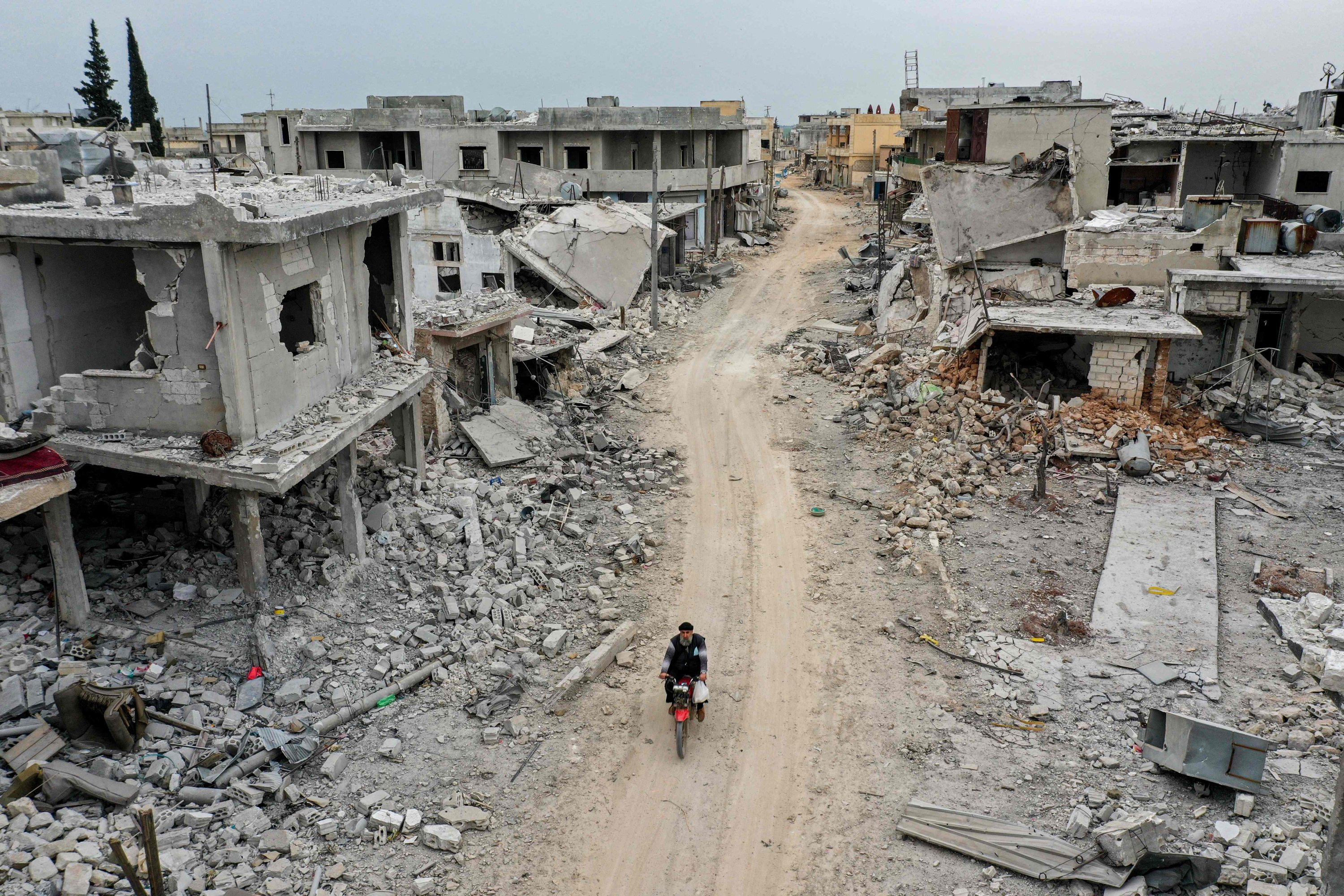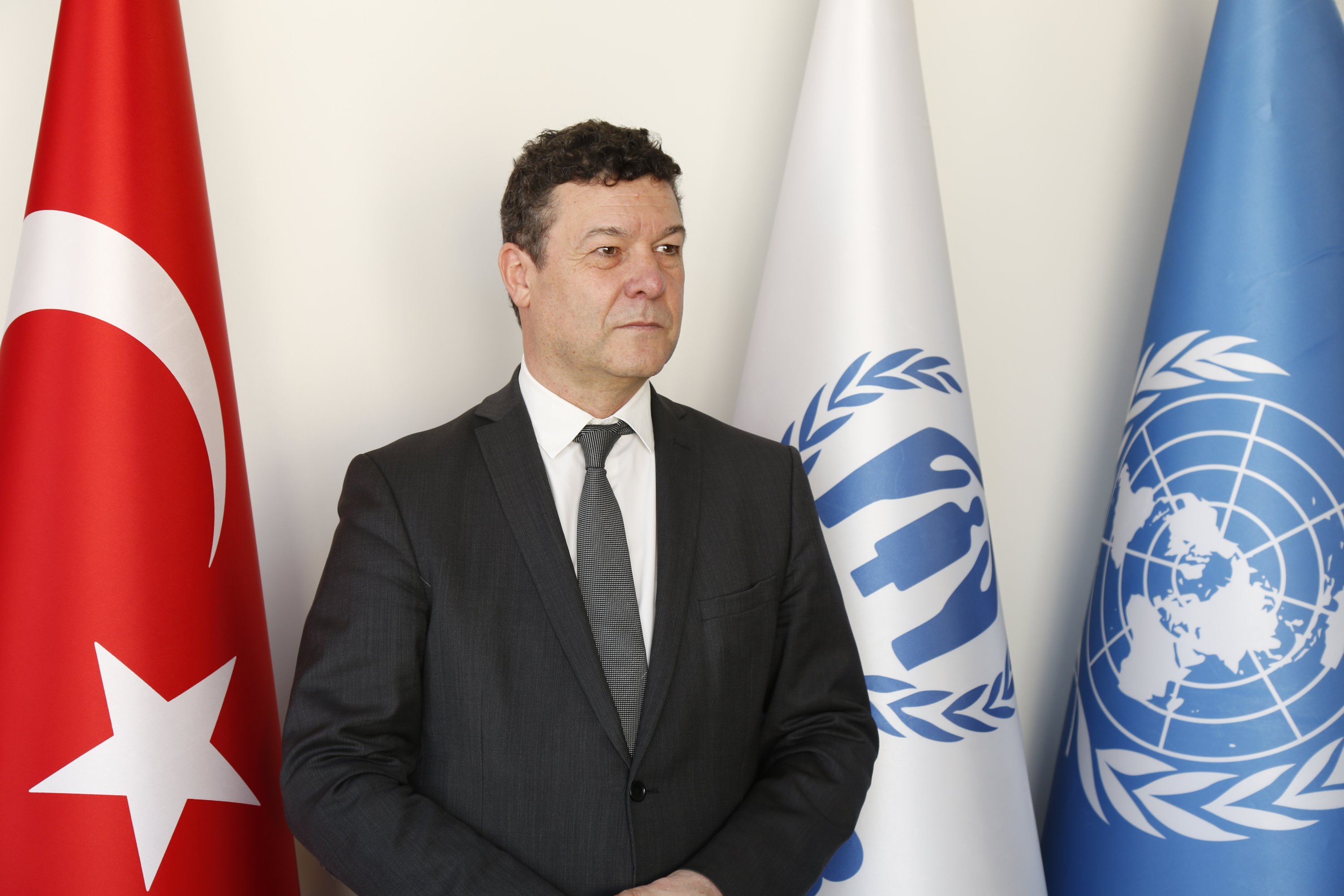© Turkuvaz Haberleşme ve Yayıncılık 2024
March 15 marks the day Syrians took to the streets for peaceful pro-democracy protests 10 years ago, inciting a crisis that developed into a multisided conflict that sucked in world powers, caused mass destruction, killed hundreds of thousands of people and displaced millions more. Ten years on, the situation of refugees and host communities is more difficult than before, United Nations High Commissioner for Refugees (UNHCR) Turkey representative Philippe Leclerc said.
“Syrians continue to suffer the consequences of the conflict, both in their country and outside. The most difficult for them is all the losses of their family members, friends, neighbors and the millions of persons who have been displaced and continue to be displaced, affecting their lives on a daily basis,” Leclerc told Daily Sabah in an exclusive interview.
Of the country’s pre-war population of 23 million, 13 million Syrians were forced to flee their homes with over 6.7 million of them fleeing across the country’s borders, the U.N. refugee agency's statistics show. Most live in neighboring Turkey, Lebanon, Iraq and Jordan.
Refugees struggle to earn a living, find safe shelter from the Bashar Assad regime and terrorist organizations and are also unable to send their children to school.
Those that choose to return often live in damaged or unfinished buildings with no doors or windows.
Over the past year, the situation has been compounded by a severe economic and financial crisis and the spread of coronavirus in this Mideast country, where medical facilities have been hard hit by a devastating war that left large parts of Syria destroyed.
Calling the Syrian civil war “the tragedy of the 21st century,” Leclerc reiterated that children who are 10 years old today have spent their whole lives amid the war in their country, while those outside do not know their country, hearing about it only from their family members. Syria’s 10-year-long civil war has killed or wounded almost 12,000 children and left millions out of school in what could have repercussions for years to come in the country, the U.N. children’s agency said last week.
The coronavirus pandemic, which has left even the most developed countries in a difficult situation, has taken a heavy toll on vulnerable Syrian refugees.

For years, the Bashar Assad regime has ignored the needs and safety of the Syrian people, only eyeing further gains of territory and crushing the opposition. With this aim, the regime has for years bombed vital facilities like schools, hospitals and residential areas, causing the displacement of almost half of the country’s population while adopting policies to make their lives more difficult.
Syrians inside and outside the war-ravaged country have been affected by the pandemic, Leclerc pointed out, also saying: “Many of the gains that we have had for all of them, thanks to the leadership of so many governments, in particular in Turkey – where education, health, access to employment is and was guaranteed – all this progress is at stake because of the progress of the pandemic. This means the emerging needs are akin to a new emergency, and past gains of refugees risk being lost.”
He elaborated that many children are being taken out of school, while many people have lost their jobs and health has become a major issue. In countries like Lebanon, hurt by economic fallout and where one-fifth of the population is refugees, the consequences are even more dramatic, Leclerc said, adding that in Turkey “where so much has been done, the effect of the pandemic on refugees is even harder than it is on Turkish citizens.”
“Losing your job when you are a refugee when you don’t have savings is not the same as anybody else. This is the heavy toll that the Syrian conflict is taking on Syrians and the communities hosting them,” he said.
Highlighting that Turkey has been providing protection and an extraordinary contribution to 3.6 million Syrians for the last 10 years, Leclerc said that the pandemic is stretching the capacities of the states to respond to the needs of both their citizens and refugees.
“Turkey is hosting 4 million people in difficult conditions because of the pandemic,” he added.
“This is why we advocate for more support to be provided by the international community to Turkey and also to all neighboring countries hosting Syrians in this 11th year. Responding to a refugee crisis and assisting refugees must be a global and shared responsibility,” he underlined.
According to Leclerc, the four main objectives are to ease the pressure on host countries, enhance refugee self-reliance, expand access to third-country solutions, and support conditions in countries of origin for people's safe return.
Turkey has frequently called on the international community to also improve humanitarian conditions inside Syria, in particular in certain areas near the Turkish border. This would allow the local population and refugees to live in areas safely. The problem cannot be just tackled by keeping people in Turkey and providing limited financial assistance to them.
Within this scope, Ankara has launched a series of counterterrorism operations and has started to build briquette houses in northwestern Syria's Idlib province, providing warm shelter for displaced Syrians and bringing the feeling of "home" back after years of suffering in makeshift tents.
Speaking about the issue, Leclerc said that a voluntary return is a right of all refugees. “All refugees have the fundamental human right to return to their country of origin at a time of their own choosing. The decision to return must be voluntary, and returns must be exercised safely and with dignity, with a situation at home that enables this to be sustainable,” he pointed out, indicating that voluntary return movements remained at a low level in 2020 in the context of restrictions as a result of COVID-19.
Explaining that refugee decisions are shaped by many considerations - security, legal, administrative, psychological and material, Leclerc said that what is important for people to return “after all the atrocities and the tragic consequences they have been gone through is durable peace.”
“But we are not there yet,” he continued. “While we appreciate the key humanitarian support provided by Turkey in assisting internally displaced people in northwest Syria, we all agree that it is crucial to address the root causes of the conflict.”
The recently appointed UNHCR representative stated that Turkey has long stood out for its tradition in responding to the needs of refugees and asylum-seekers who arrived in the country and today continues hosting the world’s largest refugee population.

The state of Turkey has been leading the response in addressing the needs of refugees and asylum-seekers residing in its territory, Leclerc said, also touching upon the contributions of the Turkish nation and its hospitality.
“Refugees not only found protection in Turkey but have been provided with security and a feeling of hope for their future,” he said.
“Turkey has a solid and comprehensive rights-based legal framework through its Law on Foreigners and International Protection and the Temporary Protection Regulation, which enables access to services including education, health care and its labor market for refugees in the country,” Leclerc stressed, saying that he is impressed by the efforts of the Turkish government and people after 10 years.
“We have to build on all the progress that has been made here. We have to ensure what has been achieved in terms of education, health, self-reliance is maintained in this extraordinarily difficult time of the pandemic affecting Turkish society as elsewhere in the world,” Leclerc said and highlighted that the UNHCR will "continue to advocate so that Turkey is assisted in continuing to provide this support so that Syrians can stand on their feet and contribute to the society that is hosting them, and preparing when the time comes, hopefully, also to rebuild their country.”
Leclerc said that the UNHCR will continue to work with Regional Refugee Resilience Plan partners to strengthen security for the refugees and access to social support mechanisms available in Turkey and to provide opportunities for refugees and host communities to interact, voice and address their concerns and for state and local actors to address barriers to social cohesion.
“The Directorate General of Migration Management-UNHCR joint harmonization initiative is ongoing to support the National Harmonization Strategy of Turkey. We will further expand our engagement with line ministries and institutions at the national, provincial, municipal and local levels,” he added.
Saying that as key agents of fostering local solutions, municipalities across Turkey provide a considerable amount of support to refugees in this regard, Leclerc pointed out that this includes vocational training, providing information on access to the job market as well as playing a catalytic role for them to establish small enterprises, such as cooperatives.
“We recognize the importance of such efforts in producing local solutions and, within the scope of its resources, support municipalities’ interventions to increase the self-reliance of both refugee and host communities,” Leclerc said.
Working previously as the UNHCR’s representative in Greece, Leclerc also commented on the recently increasing illegal pushbacks of asylum-seekers and migrants by Greek forces, documented by numerous reports of journalists, rights groups, researchers and witnesses.
“Respecting human lives and refugee rights is not a choice; it is a legal obligation,” Leclerc stressed. “While states have the legitimate right to manage their borders in accordance with international law, we ask them to do it in a protection-sensitive way and fully respect human rights law,” he stated.
Pushbacks are considered contrary to international refugee protection agreements. Under the principle of “non-refoulement,” people should not be expelled or returned to a country where their life and safety are threatened due to their race, religion, nationality or being members of a social or political group.
In recent years, Turkey and Greece have been key transit points for migrants aiming to cross into Europe, fleeing war and persecution to start new lives. Turkey has accused Greece of large-scale pushbacks and summary deportations without access to asylum procedures. It has also accused the EU of turning a blind eye to what it says is a blatant abuse of human rights.
It is important that serious inquiries are made by the competent Greek authorities as well as European Union stakeholders such as Frontex, including inquiries raised by the UNHCR, Leclerc said, adding that the UNHCR advocates for national independent monitoring mechanisms to be set up to ensure access to asylum, to prevent rights violations at borders and to ensure accountability.
Charity groups and media outlets accuse Frontex of denying people their right to apply for asylum. They say it was also complicit in, or failed to prevent, alleged pushbacks at sea by Greece's coast guard when migrants were returned to Turkish waters.
An inquiry found no link between Frontex and Aegean pushbacks. But the European Parliament has set up a “scrutiny group” to delve into the reports and human rights concerns. The EU’s anti-fraud office is also looking at them and at claims of misconduct by senior managers.
On paper, Frontex is legally accountable to the 27 member countries and the European Parliament. Out on the sea, or at land borders, though, Frontex operations are controlled by the country whose territory they take place in. In the Aegean, where many pushbacks have been reported, that means the Greek coast guard. This is where the lines of responsibility get muddy.
Frontex and Greece vehemently deny carrying out pushbacks.
Leclerc reiterated that the UNHCR has recently called on EU countries to uphold their existing commitments to refugee protection by admitting asylum-seekers at their borders, rescuing them at sea, allowing disembarkation and registering and supporting new asylum-seekers.
He also pointed out that the UNHCR stands ready to assist states in meeting these international asylum-related obligations, while it recommends that states fight against smuggling and trafficking and promote legal pathways to Europe such as increased resettlement and efficient family reunification procedures.
